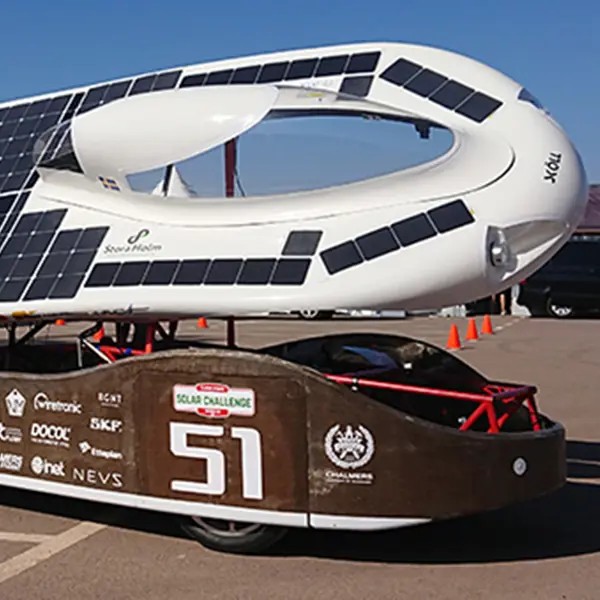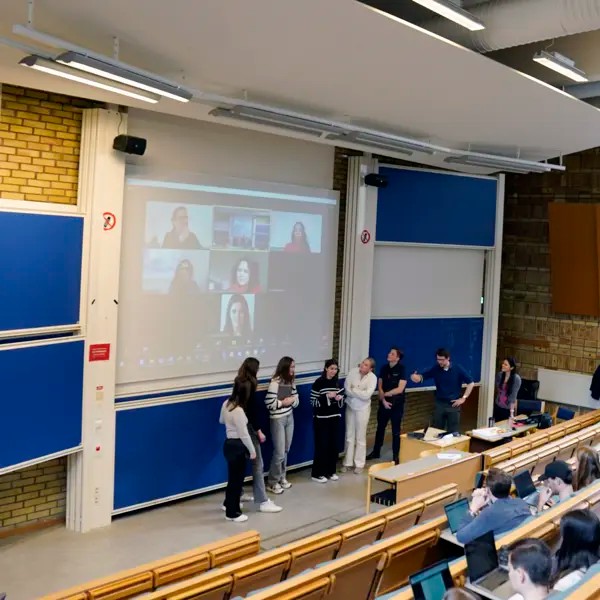


"Challenging and great fun! This is one of the best assignments I have had at Chalmers. I'm used to creating questions for our students, but this was different - more popular science. You see the little geniuses and their creativity. I really want to bring these brains here,” says Pavleta Knutsson, one of the researchers who has contributed to the tasks in the science competition "Teknikåttan" over the years.
On January 23, one of Sweden's most popular and prestigious competitions for eighth graders kicked off. More than 20,000 students will tackle tricky tasks in mathematics, technology and science, with the aim of reaching the grand national final at the Technical Museum in Stockholm on May 22. The competition, which has become a classic, inspires young people to explore future research areas and opens doors to higher education.
From past to future
“The science competition is a way for young people to get to know the different universities in the country. It encourages students and gives them a glimpse of the research going on. For those who have participated in the competition, it lowers the threshold for applying to higher education, whether they have parents with an academic background or not. This is where my commitment to the competition lies,” says Dorotea Blank, national project manager for Teknikåttan.
The questions to be answered by the students are designed by teachers and researchers based at the eleven universities and colleges around the country that are working together to enthuse a new generation of young people. They cover everything from the past to the future. Chalmers researcher Pavleta Knutsson is Associate Professor of Energy and Materials at the Department of Chemistry and Chemical Engineering and now a judge in the competition. Pavleta was the only chemist in the group of experts from all over Sweden who contributed.
“The researchers in the working group come from all sorts of disciplines. ‘It's been like a big family. We have worked with biology, chemistry, physics, maths, engineering, and astronomy. For me, it has been very exciting to meet the students, try to understand why there is not more interest in science, and see what we can do to change that,” says Pavleta.
One of her favorite subjects is chemistry, which she says cuts across many important areas, such as sustainable product development, renewable energy and health. Her own research includes materials for carbon capture.
“The level of creativity that an eighth-grader has - we often lack that. They are the same age as my own children, and sometimes they do tasks better than both me and my colleagues. I wonder what happens when and why they lose that creativity and commitment,” says Pavleta.
Dorotea Blank agrees: “In grade five, everyone is interested in the topics, but then something happens. If we don't give primary school pupils a positive image of science, it will be difficult for them to continue that path”.
During the final preparations, Dorotea Blank and the competition organisers are fine-tuning the last few questions and preparing teachers to give their pupils a pep talk ahead of the competition, with the aim of making everything run as smoothly as possible.
“This year we hope to reach more than 20 000 students,” she says.
In addition to the honour, there's also SEK 30,000 to compete for in the class treasury. But the money is perhaps not the most important thing.
"The experience of being at the country's best universities, and meeting everyone from students to astronauts to Nobel laureates, is just as valuable. ‘The goal of the participating universities is to stimulate young people's interest in STEM subjects and encourage more people to choose an education in these sectors," says Dorotea Blanck.
The competition makes students grow as a group
The questions in the competition cover a wide range of topics - from black holes to agriculture, from analysing ancient DNA to how to cook a breamburger. There are also elements of pure maths and statistics.
Teachers think it's a great opportunity for their students, and the students themselves enjoy working together in the classroom to solve problems.
"It's all about giving students collective self-confidence. Teknikåttan gives them the opportunity to grow as a group, and at the same time to stimulate interest in science and technology," says Dorotea Blank.
The competition has become an important part of many students' education, where the whole class must contribute to win, which also strengthens co-operation and cohesion.
FACTS:
Teknikåttan started in 1993, at Linköping University of Technology and is a Swedish technology and engineering competition for pupils in 8th grade. The competition aims to increase interest in technology and science and to inspire young people to study technology and engineering professions.
All content and materials used in the competition are developed by researchers and teachers at the various universities. The qualifying competition this January is digital, where everyone answers individually just to qualify the class - then it's time for the three-stage rocket with the various finals
More about Teknikåttan and which universities are collaborating on the web platform: teknikattan.se


